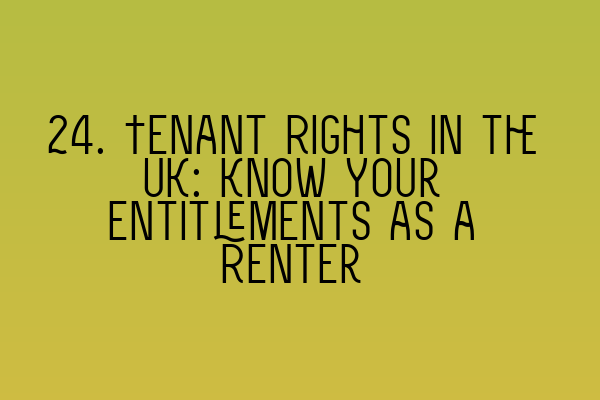Title: Tenant Rights in the UK: Know Your Entitlements as a Renter
Introduction:
As a tenant, it is crucial to be aware of your rights and entitlements in the UK. Understanding the laws and regulations that protect you can empower you to assert your rights and maintain a fair and harmonious landlord-tenant relationship. In this comprehensive guide, we will outline the key rights you have as a tenant and provide insights into how you can navigate common rental issues.
1. Right to a Written Agreement:
Before moving into a rental property, you are entitled to a written tenancy agreement. This legally binding document outlines the terms and conditions of your tenancy, including the rent, tenancy duration, and responsibilities of both the landlord and tenant. Familiarize yourself with the agreement and seek legal advice if any clauses appear unclear or unfair.
2. Security of Tenure:
The Security of Tenure Act provides tenants with the right to remain in a property, even after the initial tenancy period ends, as long as certain conditions are met. This provision gives you the reassurance that your tenancy cannot be terminated without proper legal procedures being followed.
3. Deposit Protection:
When you pay a security deposit to your landlord, they are legally obligated to protect it in a government-approved tenancy deposit scheme. This ensures that the deposit is safeguarded during your tenancy and will be returned to you, in full or in part, upon the end of your tenancy, provided you have adhered to the terms of your agreement.
4. Maintenance and Repairs:
Landlords in the UK have a responsibility to keep the property in good repair and to ensure that it meets certain health and safety standards. If you encounter any maintenance issues, such as plumbing or electrical problems, it is important to notify your landlord promptly and in writing. If they fail to address the issue within a reasonable timeframe, you may be entitled to take further action, such as involving local housing authorities or seeking legal advice.
5. Rent Increases:
Under UK law, landlords must provide tenants with a minimum notice period and valid reasons before increasing the rent. While rent increases are allowed, they must be fair and in line with market rates. If you believe the proposed rent increase is unreasonable, you can negotiate with your landlord or seek legal advice for further assistance.
6. Privacy and Notice Periods:
As a tenant, you have the right to enjoy your home without unnecessary intrusion from your landlord. They must provide you with proper notice if they wish to enter the property for inspections, repairs, or other reasons. Generally, landlords should give at least 24 hours’ notice unless it is an emergency situation.
7. Protection Against Unfair Evictions:
The UK’s rental laws protect tenants from unfair evictions. Your landlord cannot evict you without a legal reason, and they must follow the correct legal procedures, such as providing a valid notice period and obtaining a possession order from the court if necessary. If you believe you are facing an unfair eviction, it is crucial to seek legal advice immediately.
Conclusion:
Knowing your rights as a tenant is essential for ensuring a smooth and fair rental experience. By understanding the laws and regulations surrounding tenant rights in the UK, you can confidently address any issues that may arise during your tenancy. Remember, if you ever have doubts or concerns, it is advisable to seek legal advice from a qualified solicitor who specializes in property law.
Explore our related articles to enhance your legal knowledge and prepare for the SQE exams:
– SQE 1 Practice Exam Questions
– SQE 1 Practice Mocks FLK1 FLK2
– SQE 2 Preparation Courses
– SQE 1 Preparation Courses
– SRA SQE Exam Dates
Remember, being well-informed is the key to protecting your rights as a tenant.
